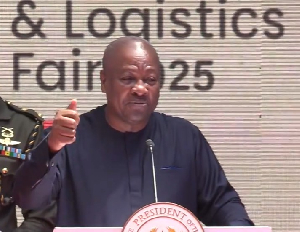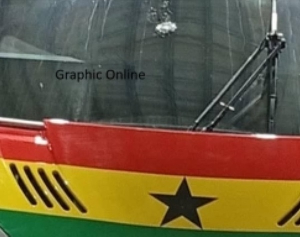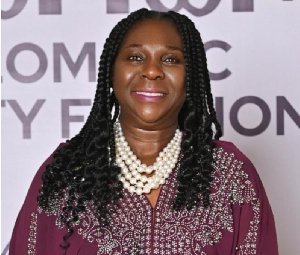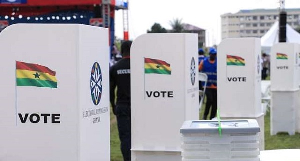Asare Otchere-Darko
In the 2008 general elections Nana Akufo-Addo had to do four things, two positive and the other two negative. On the positive side, he had to campaign on President Kufuor’s record to justify why the NPP had to be allowed to continue ‘moving Ghana forward.’ Also, he had to tell Ghanaians what his message for the future was -- what he intended to do if given power. Here he had to be careful and avoid charges like why the NPP did not do what he is promising to do in the nearly eight years that it had been in power.
Understandably he was under a collective attack from opposition parties and politicians whose duty was to turn voters against the incumbent party. But, should it be the case now, with NDC in office, that Nana Akufo-Addo and the NPP should be on the defensive? NPP politicians and supporters have no business defending Akufo-Addo or the party. They should be projecting their candidate and party if they are serious about ejecting President Mills. They should be promoting their flagbearer in order to demote Mills and his NDC.
In 2008, on the negative side, the NPP had to warn the Ghanaian people about the dangers of voting for the NDC. The case for the threat that the NDC posed for the people of Ghana relied heavily on the negative record of the NDC. Typical of this was the fact that the size of the Ghanaian economy was $6 billion in 1992, the beginning of the Fourth Republic. But by the time the NDC left office, the same variables indicated that the Ghanaian economy had shrunk (in dollar terms) to $3.9 billion! They sent Ghana to HIPC and couldn’t be trusted with the economy. Another negative campaign was that President Mills was not his own man. He would not be the one in control.
The other more powerful negative campaign was, indeed, against the incumbent party and its candidate. Corruption and drugs. What, I believe undid the NPP in 2008, apart from its own internal struggles, was an issue which was more important to Ghanaians than any of the negatives that the NDC focused on. This issue was the economy. Hardships make the campaign of corruption even more lethal against the accused. 2008 was a bad year for the economic condition of the Ghanaian, eight years of prudent economic management could not save the NPP.
Fast-track to 2012, when all the negative campaign about drugs, including marijuana, alcohol abuse and chain smoking, is said and done, the bottom line is about the economic condition of the Ghanaian. Today, the biggest two-pronged issue is about unemployment and unaffordable cost of living. President Mills themed 2011, ‘ACTION YEAR’. With 3 months of it left, what has been the positive impact of this Action Year on your life, your family, your community, your constituency, your district, your region?
Until 2007/8, the NPP had established itself as a far superior management team of the economy. The 2008 election was deliberately pitched by the NPP on a clear tape of the two parties. Records were compared and the evidence was overwhelmingly in favour of the NPP. So devastating was this that on the day that the NDC launched its campaign in March 2008, Running Mate John Mahama said the NDC would not engage the NPP in comparing records because the NDC considered that as “a recipe for mediocrity.”
Sensing a weakness, the NPP pounced on it with a press conference which had Peter Mac Manu expressing surprise at John Mahama’s comments. “The question then is why the Vice Presidential Candidate of the NDC should be against such a comparison? Our message to the NDC is that the voters would not allow them to hide their record with such flimsy excuses. We believe that NDC has carefully considered the records and concluded that such a comparison would be unflattering to their party, because NPP has by far the superior record in government”, he stressed.
According to the party Chairman, comparison would not only be on track records but also about leadership style and vision. “Let the debate be joined and let the inevitable comparison begins. Nana Akufo-Addo believes in Ghana”, he said, adding that the task ahead was about convincing Ghanaians as to which of the parties seeking their mandate could be trusted to bring about the kind of economic transformation necessary to bring prosperity to all.
But the NDC would have nothing of it. They were in opposition and the priority for them was negative campaigning. Why bother joining the NPP on a debate over performance records? Their strategy was to force the NPP to abandon talking about its own plans for the future and spend precious limited time being on the defensive. Indeed, the worst thing in politics is to fight a negative. The more time you spend defending a negative the more light you throw on the negative and the less time you leave for yourself to sell your own positive message. The simple answer is to give a quick rebuttal of the negative, return one of your own (it works even better when you are in opposition) and land on your strengths.
If the US embassy cable of October 12, 2007 is anything to go by then the ‘revelation’ by the man in charge of the NDC propaganda machinery at the time explains why the NDC was deliberate in attacking the personality of Akufo-Addo in 2008.
The cables, as leaked by Wikileaks, have Fiifi Kwettey assessing NPP presidential aspirants. It reads, “Among the NPP candidates, Kwetey said NDC insiders view former Foreign Minister Nana Akufo-Addo as the most formidable potential opponent in the general election. He noted that Akufo-Addo is well-funded, popular, charismatic, and has great appeal to younger voters...”
Prof Mills set the stage with a press conference where he accused the NPP of turning Ghana into a drugs haven, inspiring his attack poodles to go on the offensive, bending Akufo-Addo’s record and offering the NPP little breathing space to set the actual records straight.
But, I am not sure how effective that was. What hurt the NPP more than anything else, in my view, was the economic downturn from the last quarter of 2007, which reached a devastating peak in August 2008. Until the end of 2007, the NPP’s record on the economy was taken for granted. But by election year, the NPP had lost serious credibility on the economy. It did not matter to the voter that President Kufuor could do very little about the global crisis. It did not matter that the NPP economy was far resistant of the external shocks than the NDC economy of 2000, which suffered a milder shock. So devastating was this that the NPP was even shy to trumpet its economic achievements in 2008 for fear of being branded out of touch. The election was to be fought on Education and Health!
The NPP started 2007 with inflation at 10.9% and with great hopes of ending the year with single digit inflation. By October inflation was at 10.2%, so confident was the party that it believed winning the presidential primary was even more important than the general election, which was viewed by many as a done deal.
But, the economy had plans of its own. The persistent increase in the world crude prices in the last quarter of 2007 translated into significant increases in the general prices of goods and services on the Ghanaian market. Inflation for December 2007 was 12.7%, and prices never looked back until they saw the back of the NPP a year down the line.
Five months down the line, when Prof Mills said Ghana was becoming a safe haven for drug dealers. The Chronicle captured the high-powered NPP response with this negative headline: “WE DO NOT DEAL WITH DRUGS – NPP”.
In his press conference, the NPP Chairman spent just a few lines debunking the NDC charges on drugs and corruption and focused on the attributes of Nana Akufo-Addo and on the superior record of the NPP to establish that the future of the nation was safer with the NPP.
For him, the 2008 election was about choices, the NPP therefore appealed to Ghanaians to think deeply about the choices before them since according to the party, “we cannot afford to take this country back. The NDC is artfully urging Ghanaians to discard their collective memory of P/NDC that squandered the opportunities they had in almost two terms in office.”
2012 IS ABOUT CHARACTER OF LEADERSHIP
The NDC would have nothing of it. They made that contest one of “character” between the personality of Nana Akufo-Addo and Prof Atta Mills and are determined to do so again in 2012. However, the NDC has artfully limited the characteristic of leadership to humility (which they are confusing with timidity) and the fear of God. The issue is this: what is the use if a leader who claims to be God-fearing is not poverty-fearing?
The NDC did quite well to define Mills and to redefine Akufo-Addo to the Ghanaian electorate. But, how effective was that when Akufo-Addo beat Mills by over 100,000 votes on December 7, 2008? How much has the character of Mills as defined by the NDC before 2009 been borne out by the leadership of Mills at the presidency? That is the question the NPP must be throwing out there and offering some useful answers of their own.
Character develops over time, not overnight, cooked in the kitchen of propaganda and served to a public hooked on sensationalism. What has been Akufo-Addo’s character of leadership since the 1970s? What about that of Mills? Character does not change quickly. As an expert puts it, a person's observable behaviour is an indication of his character. This behaviour can be strong or weak, good or bad. A person with strong character shows drive, energy, determination, self-discipline, willpower, and nerve. He sees what he wants and goes after it. He attracts followers. The most important character of a leader is that he must be able to face problems and solve problems.
Opinions of Saturday, 17 September 2011
Columnist: Otchere-Darko, Gabby Asare
Defending A Negative Highlights A Negative, But Character Is Key
Business

Malfunctioning AC, No Water: President Mahama bemoans poor state of World Trade Centre building
Entertainment











